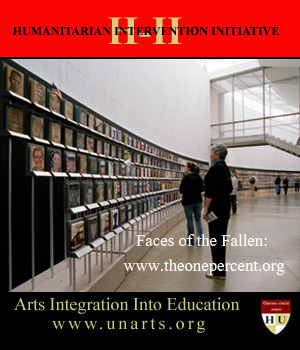December 2011
United
Nations Arts Initiative
Arts
Integration Into Education
Url:
www.unarts.org
Twitter:
unarts
Humanitarian
Intervention Initiative
United
Nations Arts Initiative
Url:
www.unarts.org/H-II

Remembering 6303 Fallen Troops - Human Rights Day 2011
6,303
U.S. service members have died in Operation Iraqi Freedom and Operation
Enduring Freedom:
Faces
of the Fallen:
Washington Post.
Country
Music Artist H-II Stephen Michael Apatow (H-II.org) is
calling on our nation to remember our troops, who place their life on
the line to defend the United States and members of the international
community, so we can live in freedom, peace and security. As an Advocate
and Educator in Operational Security for Special Forces
Troops for Humanitarian Operations,
he emphasizes the importance of U.S., NATO and UN Peacekeeping forces
in the War Against Terrorism and global threat presented by
conventional weapons and weapons of mass destruction (CBRN).
[1,2] The
soundtracks "Special Forces Prayer" and "The Soldiers Tear," from the
album "Country
Goes Global,"
[3] hold special meaning for those serving and the families of those
who have made the ultimate sacrifice.
Human
Rights Day 2011 [4]
The Universal Declaration
of Human Rights (UDHR) [5] was adopted
on 10 December 1948. The date has since served to mark Human Rights Day
worldwide. The High Commissioner for Human Rights, [6] as the main UN
rights official, and her Office play a major role in coordinating
efforts for the yearly observance of Human Rights Day.
In
support of these efforts, the Humanitarian Intervention Initiative
was developed in collaboration with Humanitarian Resource Institute and
the United Nations Arts Initiative to support Human Rights through Arts
Integration Into Education initiatives across the globe.
"Non
Lethal Fires" hearts and minds encompasses the new
international strategic focus for Humanitarian Intervention
with an objective of ending or reducing the suffering that is the
result of civil war, humanitarian crisis, or crimes of genocide. The
goal of humanitarian intervention is minimization of the suffering of
civilians in a particular state in accordance with
the Universal
Declaration of Human Rights (UDHR).
The
Declaration was explicitly adopted for the purpose of defining the
meaning of the words "fundamental freedoms" and "human
rights" appearing in the United Nations Charter, which is binding on
all member
states. For this reason, the Universal
Declaration is a fundamental constitutive document of the United
Nations. The 1968 United Nations International Conference on Human
Rights advised that it "constitutes an obligation for the members
of the international community" to all
persons. The declaration has served as the foundation for two
binding UN human rights covenants, the International
Covenant on Civil and Political Rights
[7] and the
International Covenant on Economic, Social and
Cultural
Rights [8]
and the principles of the Declaration are elaborated in
international treaties such as the International Convention on the
Elimination of All
Forms of Racial Discrimination, the International Convention on the
Elimination
of Discrimination Against Women, the United Nations Convention on the
Rights
of the Child, the United Nations Convention Against Torture and many
more.
The
focus of the H-II project
is global exposure, strategic planning, development, engagement and
stabilization of humanitarian emergencies. This spotlight targets the
vulnerable in efforts to engage an immediate international
response.
The Humanitarian Intervention Initiative is on the web at:
www.unarts.org/H-II
Country
Reports
2010
Country Reports on Human Rights Practices [9]
Naval
Postgraduate School Center for Homeland Defense and Security,
sponsored by the U.S. Department of Homeland Security's National
Preparedness Directorate, FEMA.
This
collection of reports provide detailed information on human
rights in countries throughout the world. including those places where
protests have been ongoing such as Syria, Bahrain, and Yemen. The
reports cover internationally recognized individual, civil, political,
and worker rights, as set forth in the Universal Declaration of Human
Rights.
9:
2010
Country Reports on Human Rights Practices: U.S. State Department. Url:
http://www.state.gov/g/drl/rls/hrrpt/2010/
###
|